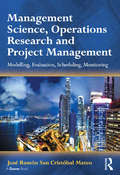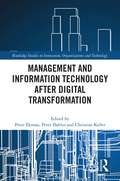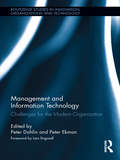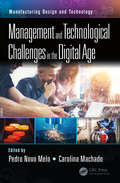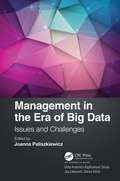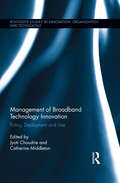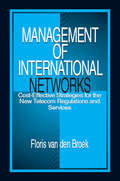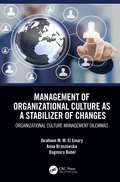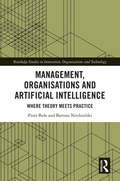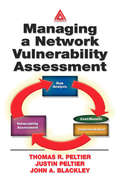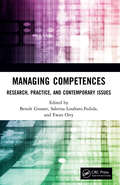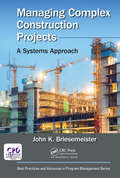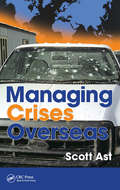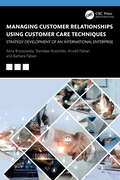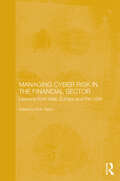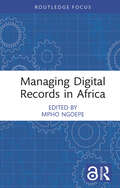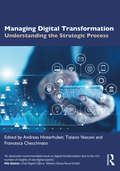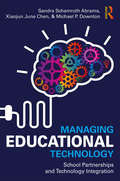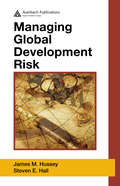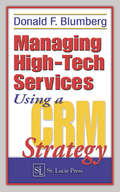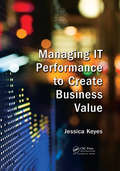- Table View
- List View
Management Science, Operations Research and Project Management: Modelling, Evaluation, Scheduling, Monitoring
by José Ramón MateoDue to its societal and economic relevance, Project Management (PM) has become an important discipline and a concept critical to modern organizations, public and private. PM as an academic discipline is discussed both in Management Science and in Operations Research. Management Science tends to focus on quantitative tools and the soft skills necessary to manage projects successfully. Operations Research gives the essential scientific contribution to the success of project management through the development of models and algorithms. In Management Science, Operations Research and Project Management, José Ramón San Cristóbal Mateo fills the gap between scientific research and the practical application of that research. Project managers need formal training in decision-making but sometimes, they do not have an in-depth knowledge of Operations Research or they lack the necessary theoretical background. This book, with its focus on the quantitative models of Operations Research and Management Science applied to Project Management, provides project managers with the tools and methods necessary to manage projects successfully. Project managers operate in a complex global environment, in which numerous factors need to be considered, such as minimizing total project costs, meeting contracted dates, and ensuring that activities achieve certain quality levels. The focus here on the application of quantitative models of Operations Research and Management Science applied to Project Management provides them with the tools and methods necessary to make sound decisions.
Management and Information Technology after Digital Transformation (Routledge Studies in Innovation, Organizations and Technology)
by Peter Dahlin Peter Ekman Christina KellerWith the widespread transformation of information into digital form throughout society – firms and organisations are embracing this development to adopt multiple types of IT to increase internal efficiency and to achieve external visibility and effectiveness – we have now reached a position where there is data in abundance and the challenge is to manage and make use of it fully. This book addresses this new managerial situation, the post-digitalisation era, and offers novel perspectives on managing the digital landscape. The topics span how the post-digitalisation era has the potential to renew organisations, markets and society. The chapters of the book are structured in three topical sections but can also be read individually. The chapters are structured to offer insights into the developments that take place at the intersection of the management, information systems and computer science disciplines. It features more than 70 researchers and managers as collaborating authors in 23 thought-provoking chapters. Written for scholars, researchers, students and managers from the management, information systems and computer science disciplines, the book presents a comprehensive and thought-provoking contribution on the challenges of managing organisations and engaging in global markets when tools, systems and data are abundant.
Management and Information Technology: Challenges for the Modern Organization (Routledge Studies in Innovation, Organizations and Technology)
by Lars Engwall Peter Dahlin Peter EkmanInformation technology has come to play an important role in organizations over the last few decades. Though it began as an entity dealt with by specialists, IT has evolved to become an everyday tool with both operational and strategic impacts. Most modern organizations have adopted different forms of IT, and become dependent on their computer-based information systems and their peripherals for everyday operations. Information technology offers opportunities to increase efficiency, customer value, and competitiveness. Given the financial investment in IT required by organizations to remain competitive, IT has become a resource that needs to be managed. Management and Information Technology evaluates organizations’ utilization of IT including knowledge management and e-learning, accounting, and business relationships. Presenting theories to help the reader understand the varying roles IT can occupy in different organizations, this volume illustrates the ways in which IT has become a key strategic tool.
Management and Sustainability in the Belt and Road
by Andrew W. H. Ip Lianne K. W. LamChina’s Belt and Road Initiatives (BRI) is an ambitious infrastructure project conceived in 2013 by President Xi Jinping with development and investment initiatives stretching from Asia and Europe that reflect the original Silk Road with business networks through countries such as Afghanistan, Kazakhstan, Kyrgyzstan, Tajikistan, Turkmenistan, and Uzbekistan, as well as India and Pakistan, spanning a route of more than 4,000 miles and history that can be dated back more than 2,200 years. Given the background of China’s unique approach in fighting COVID-19, and against the backdrop of sluggish economic growth, innovation, and management, sustainable development of BRI will be the key and the driving force for the post-pandemic economic recovery of many countries, especially as BRI countries now account for nearly 30% of China’s foreign trade and 15% of outward direct investment. The vision to create a vast network of railways, energy pipelines, highways, and streamlined border crossings to expand the international use of Chinese currency and improve connectivity to China is good foresight and proved fortuitous when the COVID-19 pandemic came to plague the world, and amid the conflicts between the United States and China as well as the war between Russia and Ukraine. Since the inception of BRI, many books have been written to cover topics ranging from globalization to detailing how China’s business and politics are a major motivation for China’s overseas economic activities with case studies and practices, yet few of these books provide a structured approach to the sustainable management of BRI projects. This book is about how to manage the innovation, sustainability, and business necessary to make BRI work and how to handle the issues, problems, and crises that may arise in the process. Participants of BRI projects can take on many different roles, but ultimately, it is team effort and leadership that creates successful projects. Here, readers will find guidelines and insights to survive and prosper in a myriad of BRI opportunities and risks. Most important of all, this book provides a glimpse of different approaches for success in BRI projects, including sustainability, environmental issues, social and political aspects, technology, choice of industry, project management, education and training, governance, and many more.
Management and Technological Challenges in the Digital Age (Manufacturing Design and Technology)
by Carolina Machado Pedro Novo MeloBusinesses operate amid a digital age, and unsurprisingly, technology has engendered tools that now predominate all corners of the workplace. The ascendancy of new hardware and software poses new challenges for professionals in the field of management and human resources as corporations and companies routinely implement and incorporate digital software for goals such as improving worker productivity and tasks such as screening highly qualified candidates for vacancies. In the face of rapid change, professionals must investigate how the use of digital technology affects the culture of hiring processes, employee morale, company management, and corporate image. This book aims to promote research related to these new trends and open a new field within the areas of management and engineering. Through the course of nine chapters, contributors to Management and Technological Challenges in the Digital Age grapple with the theoretical and practical implications that technological usage carries across the range of small and large organizations in the world of business. <li>Focuses on the latest research findings that are occurring in this field in different countries <li>Shows how companies around the world are facing today's technological challenges <li>Shares knowledge and insights on an international scale <li>Keeps the readers and researchers informed about the latest developments in the field and forthcoming international studies <li>Explains how the use of technology allows management to take a more strategic role in organizations <P><P>This book affords a thorough engagement with the progresses and setbacks made through the enlistment of technological equipment and computerized procedures in the field of human resources and management while interrogating the future challenges of technology’s role.
Management in the Era of Big Data: Issues and Challenges (Data Analytics Applications)
by Joanna PaliszkiewiczThis book is a wonderful collection of chapters that posits how managers need to cope in the Big Data era. It highlights many of the emerging developments in technologies, applications, and trends related to management’s needs in this Big Data era. —Dr. Jay Liebowitz, Harrisburg University of Science and Technology This book presents some meaningful work on Big Data analytics and its applications. Each chapter generates helpful guidance to the readers on Big Data analytics and its applications, challenges, and prospects that is necessary for organizational strategic direction. —Dr. Alex Koohang, Middle Georgia State University Big Data is a concept that has caught the attention of practitioners, academicians, and researchers. Big Data offers organizations the possibility of gaining a competitive advantage by managing, collecting, and analyzing massive amounts of data. As the promises and challenges posed by Big Data have increased over the past decade, significant issues have developed regarding how data can be used for improving management. Big Data can be understood as large amounts of data generated by the Internet and a variety of connected smart devices and sensors. This book discusses the main challenges posed by Big Data in a manner relevant to both practitioners and scholars. It examines how companies can leverage Big Data analytics to act and optimize the business. This book brings together the theory and practice of management in the era of Big Data. It offers a look at the current state of Big Data, including a comprehensive overview of both research and practical applications. By bringing together conceptual thinking and empirical research on the nature, meaning, and development of Big Data in management, this book unifies research on Big Data in management to stimulate new directions for academic investigation as well as practice.
Management of Broadband Technology and Innovation: Policy, Deployment, and Use (Routledge Studies in Innovation, Organizations and Technology)
by Jyoti Choudrie Catherine MiddletonWhen one considers broadband, the Internet immediately springs to mind. However, broadband is impacting society in many ways. For instance, broadband networks can be used to deliver healthcare or community related services to individuals who don't have computers, have distance as an issue to contend with, or don't use the internet. Broadband can support better management of scarce energy resources with the advent of smart grids, enables improved teleworking capacity and opens up a world of new entertainment possibilities. Yet scholarly examinations of broadband technology have so far examined adoption, usage, or diffusion but missed exploring the capacity of broadband networks to enable new applications, the management aspects of funding and developing broadband-enabled services, or the policy environment in which such networks are developed. This book explores a wide range of issues associated with the deployment and use of broadband including its impacts on individuals, organizations, and society, and offers a generalist understanding of the technical aspects of broadband. Management of Broadband Technology and Innovation offers insights on broadband from the perspectives of Information Systems, Management, Strategy, and Communications Policy scholars, drawing on research from these disciplines to inform diverse aspects of broadband deployment, policy, and use. Issues associated with a subject technical in nature, but now researched in many ways, are emphasised. This book explains various softer aspects of broadband deployment and use, focusing on the benefits of broadband rather than on details of the technology.
Management of International Networks: Cost-Effective Strategies for the New Telecom Regulations and Services
by Floris van den BroekEffective management of a communications network can be a difficult and costly activity, and even more so when the network crosses international borders. International network managers face a number of issues that are crucial to strategic decision-making, including the varying telecommunications regulations, operators, and services found within-as
Management of Organizational Culture as a Stabilizer of Changes: Organizational Culture Management Dilemmas
by Ibrahiem M. El Emary Anna Brzozowska Dagmara BubelNo enterprise today is proud of being unchanged. Stability is understood more as a sign of stagnation than reliability, and enterprises that do not change and do not evolve are commonly regarded as fossilized. Increasing globalization processes often force today’s enterprises to make organizational changes, but the effectiveness of these processes relies on its organizational culture. This book argues that the problem behind organizational culture is its multilevel structure, including the visible and hidden levels. It addresses difficult questions, such as: Is it better to make thorough, but more painful changes, or to gradually introduce small improvements? It also demonstrates that organizational culture is not a fixed phenomenon: its shaping takes place in stages, and it is essential to take such stages into account in the process of implementing the strategy of an enterprise. Providing a comprehensive insight into "organizational culture" and its relationship to change, this book will be essential reading for professionals involved in business management and IT management throughout the world. Its analyses and suggestions will allow for improved organizational culture and change management in business environments.
Management, Organisations and Artificial Intelligence: Where Theory Meets Practice (Routledge Studies in Innovation, Organizations and Technology)
by Piotr Buła Bartosz NiedzielskiThis book combines academic research with practical guidelines in methods and techniques to supplement existing knowledge relating to organizational management in the era of digital acceleration. It offers a simple layout with concise but rich content presented in an engaging, accessible style and the authors’ holistic approach is unique in the field. From a universalist perspective, the book examines and analyzes the development of, among others, Industry 4.0, artificial intelligence (AI), AI 2.0, AI systems and platforms, algorithmics, new paradigms of organization management, business ecosystems, data processing models in AI-based organizations and AI strategies in the global perspective. An additional strength of the book is its relevance and contemporary nature, featuring information, data, forecasts or scenarios reaching up to 2030. How does one build, step by step, an organization that will be based on artificial intelligence technology and gain measurable benefits from it, for instance, as a result of its involvement in the creation of the so-called mesh ecosystem? The answer to this and many other pertinent questions are provided in this book. This timely and important book will appeal to scholars and students across the fields of organizational management and innovation and technology management, as well as managers, educators, scientists, entrepreneurs, innovators and more.
Managing A Nation: The Microcomputer Software Catalog--second Edition
by Richard Harwood David Holland John D. Sterman James W. Mercer Margee M. Ensign Martha J. Garrett Gerald O. Barney W. Brian Kreutzer Stephen J. Binhak Jennie M. Hommel J. G. Krishnayya Lynn A. Kurtz Kenneth L. Kvamme Norman Meyers Peter J. Opdahl Ann Elise Schneider Alan M. Thorndike Daniel Tunstall Sheryl WilkinsThis book is a collection of reviews of microcomputer programs of special relevance to those people around the world who are responsible for the management of the current and future affairs and business of their countries.
Managing A Network Vulnerability Assessment
by Thomas R. Peltier Justin Peltier John A. BlackleyThe instant access that hackers have to the latest tools and techniques demands that companies become more aggressive in defending the security of their networks. Conducting a network vulnerability assessment, a self-induced hack attack, identifies the network components and faults in policies, and procedures that expose a company to the damage caused by malicious network intruders. Managing a Network Vulnerability Assessment provides a formal framework for finding and eliminating network security threats, ensuring that no vulnerabilities are overlooked. This thorough overview focuses on the steps necessary to successfully manage an assessment, including the development of a scope statement, the understanding and proper use of assessment methodology, the creation of an expert assessment team, and the production of a valuable response report. The book also details what commercial, freeware, and shareware tools are available, how they work, and how to use them. By following the procedures outlined in this guide, a company can pinpoint what individual parts of their network need to be hardened, and avoid expensive and unnecessary purchases.
Managing Business Projects: The Essentials
by Frank EinhornManaging Business Projects: The Essentials differs from many other project management textbooks. Foremost, it is about business projects as opposed to construction or engineering projects. Although many techniques, like schedule management, apply to both, they are usually applied differently. As its title conveys, the book explains the essential techniques and perspectives needed for business projects to be successful. The focus is on small and medium sized projects, up to $20 million, but often below $1 million. Some literature favors large and mega-projects, but for every mega-project there are many thousands of smaller projects which are vital to the organization and could involve considerable complexity and risk. Nevertheless, the techniques outlined here also apply to mega-projects and their many subprojects; they even apply to some aspects of construction or engineering projects. This book does not aim to cover all project management techniques. In real life there is simply not time for sophisticated ‘should-dos.' Rather, it covers the essentials that apply to almost all business projects; these are unlikely to change in the future even as technology and methodologies advance. The driving idea, which is stated repeatedly, is to do the essentials and to do them consistently and well. Strong emphasis is placed on things that happen before, around, and after the project itself. So, while the basic disciplines like engaging with stakeholders, managing scope, schedules, costs, risks, issues, changes, and communication, are thoroughly explained, other important aspects are covered. These include: governance of a project and of a portfolio of projects, project selection with its financial and non-financial aspects, effective use of the business case through to benefits realization, procurement, outsourcing and partnership, and also the agile mindset that is valuable beyond Agile projects. Besides project managers and sponsors, this book is intended for people who are working in business or government, at any level, or for MBA students. It offers perspectives that enable them to learn more from their everyday experience. It is not aimed at undergraduate students, although many would benefit from the contents.
Managing Competences: Research, Practice, and Contemporary Issues
by Benoît Grasser, Sabrina Loufrani-Fedida, and Ewan OiryManaging Competences: Research, Practice, and Contemporary Issues draws together theoretical and practical research in competence management. It provides a wealth of knowledge concerning emerging and contemporary issues, such as the multilevel approach to competence, the development of collective competence, the strategies of competence management, and the tools for managing competences as well as the organizational dynamics of competences. Moreover, the book provides a critical approach to research and practitioners’ continued engagement in competence management research and practice. Research in competence management has more recently entered an era more open to doubt and questioning: Is there a solid theoretical foundation that supports the concept of competence? What is the contribution of research on employees’ competences to human resources management in particular, and more generally to management? Is there not a risk of diluting the concept of competence by considering it at the individual, collective, organizational, and strategic levels? Today, is it still possible to manage competences in a world where the boundaries of the organizations are more and more porous? These questions, and many others, probably explain why a field that seemed well-identified and well-structured yesterday, has given way today to new, highly diverse analyses of competences by researchers and practitioners. This contributed volume seeks to answer these pressing issues and is a collective means for responding to them. The book brings together multiple streams of research in the field about emerging and contemporary issues, including multidimensional HRM systems, the rise of forms of collaborative management, the intensification of the use of digital and robotic technologies, the rise of the regime of remote and networked operations, the increasing heterogeneity of the status of workers, and changes in regulations concerning work and its recognition.
Managing Complex Change in School: Engaging pedagogy, technology, learning and leadership
by Keith Morrison Alejandro Salcedo Garcia Ah Chung Tsoi Jinming HeLeading and managing change in schools is a complex topic. In this timely book the authors take the reader through a journey of how to lead and manage multidimensional change in order to create engaged learners, teachers, leaders and managers. They provide a readable and straightforward account of a major, high-profile innovation in one school and draw from it key lessons for leaders and managers of change in schools. Managing Complex Change in School synthesizes a wealth of literature and research on managing change, and shows how the emerging field of complexity theory can inform the effective management of multidimensional change. Arising from an in-depth, mixed methods evaluation of the key school, this book is practice-focused and is an invaluable companion for practitioners handling positive change in schools.
Managing Complex Construction Projects: A Systems Approach (Best Practices in Portfolio, Program, and Project Management)
by John K. BriesemeisterTo many program, project, or construction managers, a complex project seems to be a labyrinth with many hidden dangers. This book is a guide through that labyrinth. It explains best practices and provides insight so they cannot only identify hidden dangers but also effectively manage the construction process to either mitigate or eliminate these risks. <P><P>The book presents a systems-based approach to construction project management that can facilitate a greater understanding of the complexity inherent in large construction projects and how that complexity can be effectively managed. The systems approach permits the onsite construction project manager to take a complex construction project, break it down into manageable pieces, and ensure that all systems are in alignment with the original goal of the project. This approach combines industrial engineering, project management, and finance into a unified approach for effective management of complex construction projects, ranging from a power plant to a highway project. <P><P>The book explains how to manage construction projects successfully through an approach based on the three following systems: <P><P>Project Management System <P><P>Work Management System <P><P>Quality Management System <P><P>The problem with complex programs and projects is that many managers are only equipped with a knowledge of project management. A system for construction is a collection of many processes effectively working together to produce a specific deliverable, which is usually defined in the program or project’s contract. This system has a series of specific inputs and outputs, which are what the customer expects from the company or companies performing the work. This book develops checklists based on these inputs and outputs, which managers can use when first arriving onsite, and provides a "nuts and bolts" approach for managing a complex construction project onsite. <P><P>The author shares valuable lessons learned during a career of more than thirty years of working on various construction sites around the world. These lessons learned are filled with valuable information to aid readers become more effective as a program, project, or construction manager of complex construction projects.
Managing Crises Overseas
by Scott Alan AstThe book examines crisis management for operations located outside of a corporation’s normal confines, particularly in regions which might be overtly threatening or hostile to multinational corporations and their people and assets overseas. Outlining proper operating procedures, planning, implementation, and drills, it demonstrates how proper planning and effective management systems in place prior to a crisis can mean the difference between life and death. The book helps organizations establish best practices in crisis management to ensure safety and security of personnel, assets, and properties overseas, even in potentially volatile environments.
Managing Customer Relationships Using Customer Care Techniques: Strategy Development of an International Enterprise
by Anna Brzozowska Arnold Pabian Barbara Pabian Stanisław BrzezińskiIn today’s global business environment, Customer Relationship Management (CRM) has become key to the success of many international enterprises. Managing Customer Relationships Using Customer Care Techniques: Strategy Development of an International Enterprise offers a comprehensive analysis of this crucial business aspect, focusing on how companies can effectively manage their customer relationships in the context of global expansion. This book stands out with its unique approach to CRM, blending theory with practice and providing readers with a deep understanding of how CRM influences the strategies of international enterprises.The book is divided into four main parts, each focusing on a different aspect of customer relationship management. The first part focuses on creating strategies in the context of customer relationships in international enterprises, the second part discusses the essence of the CRM concept in companies, the third part delves into the strategy of a global enterprise from the customer relationship perspective, and the fourth part centers on the evaluation and optimization of customer care strategy in modern business.Key Features:• In-depth analysis of the CRM concept in the context of international business.• Discussion on the evolution of the CRM idea over the years.• Introduction to integrated customer relationship management systems in global enterprises.• Analysis of the impact of social media on CRM.• Practical insights on measuring the effectiveness of customer care activities.Managing Customer Relationships Using Customer Care Techniques: Strategy Development of an International Enterprise is a must-read for managers, business consultants, business students, and anyone wanting to understand how to effectively manage customer relationships in an international business environment.
Managing Cyber Risk in the Financial Sector: Lessons from Asia, Europe and the USA (Routledge Studies in the Growth Economies of Asia)
by Ruth TaplinCyber risk has become increasingly reported as a major problem for financial sector businesses. It takes many forms including fraud for purely monetary gain, hacking by people hostile to a company causing business interruption or damage to reputation, theft by criminals or malicious individuals of the very large amounts of customer information (“big data”) held by many companies, misuse including accidental misuse or lack of use of such data, loss of key intellectual property, and the theft of health and medical data which can have a profound effect on the insurance sector. This book assesses the major cyber risks to businesses and discusses how they can be managed and the risks reduced. It includes case studies of the situation in different financial sectors and countries in relation to East Asia, Europe and the United States. It takes an interdisciplinary approach assessing cyber risks and management solutions from an economic, management risk, legal, security intelligence, insurance, banking and cultural perspective.
Managing Digital Records in Africa
by Mpho NgoepeManaging Digital Records in Africa draws on the research work of the InterPARES Trust (ITrust) project that investigated interrelated archival issues focusing on legal analysis, infrastructure, trust, authentication, and education within the African context. This research-focused book provides a legal analysis and systematic assessment of how African institutions manage digital records in four countries (i.e., Botswana, Kenya, South Africa, and Zimbabwe). It also examines the extent to which records are managed using Internet-based applications, trust in such records, and digital record authentication to support the auditing process. Finally, it provides a curriculum analysis in digital records at institutions of higher learning in 38 African countries. The book's case studies illustrate the threads of discussion, which span the ITrust domains of legislation, infrastructure, authentication, trust, and education in archives and records management. The book can be used as a premier reference source by private and public organizations, researchers, educators, archivists, records managers, and postgraduate students to make informed decisions about digital records, records management systems, cloud-based services, authenticating records, and identifying universities on the continent that offer archival programmes. The book may also find expression to practitioners in other fields such as law and auditing.
Managing Digital Transformation: Understanding the Strategic Process
by Andreas HinterhuberThis book provides practising executives and academics with the theories and best practices to plan and implement the digital transformation successfully. Key benefits: an overview on how leading companies plan and implement digital transformation interviews with chief executive officers and chief digital officers of leading companies – Bulgari, Deutsche Bahn, Henkel, Lanxess, L’Oréal, Unilever, Thales and others – explore lessons learnt and roadmaps to successful implementation research and case studies on the digitalization of small and medium-sized companies cutting-edge academic research on business models, organizational capabilities and performance implications of the digital transformation tools and insights into how to overcome internal resistance, build digital capabilities, align the organization, develop the ecosystem and create customer value to implement digital strategies that increase profits Managing Digital Transformation is unique in its approach, combining rigorous academic theory with practical insights and contributions from companies that are, according to leading academic thinkers, at the forefront of global best practice in the digital transformation. It is a recommended reading both for practitioners looking to implement digital strategies within their own organisations, as well as for academics and postgraduate students studying digital transformation, strategy and marketing.
Managing Educational Technology: School Partnerships and Technology Integration
by Sandra Schamroth Abrams Xiaojun June Chen Michael P. DowntonManaging Educational Technology: School Partnerships and Technology Integration by Sandra Schamroth Abrams, Xiaojun June Chen, and Michael P. Downton. Sandra Schamroth Abrams is an associate professor in the Department of Curriculum and Instruction at St. John’s University, USA. Xiaojun Chen is an associate professor of educational technologies in the Department of Curriculum and Instruction at St. John’s University, USA. Michael P. Downton is an assistant professor in the Department of Curriculum and Instruction at St. John’s University, USA.
Managing Global Development Risk
by Steven E. Hall James M. HusseyWhile global sourcing has expanded dramatically in terms of activities, consistent challenges remain for organizations that choose such a business decision. These challenges include maximizing the opportunity afforded by globalization, fully realizing potential gains, and managing the risks inherent to global development. In addition, while companies continue to start or expand their use of global resources, little is being done to help project managers, business analysts, architects, and others succeed in this new environment. Built upon real-world experiences, Managing Global Development Risk provides the tools, techniques, and knowledge necessary to achieve project success with offshore resources. By reading and utilizing the templates within this book, you will acquire: Knowledge of project management principles and their application, Understanding of software development processes and their application , Insight into the diverse personalities within your global development team and the appropriate management and communications style to achieve success. Awareness of cultural issues and mannerisms that will enhance your ability to guide your team To fully realize the benefits of global development, a proper mix of local and offshore resources is essential. This book is an important tool that can help you gain the necessary competency and expand your skills in this critical area.
Managing High-Tech Services Using a CRM Strategy
by Donald F. BlumbergAs high-tech service industries grow more competitive, the need to develop customer focused business strategies becomes imperative. Managing High-Tech Services Using a CRM Strategy explores how to manage and direct any service organization utilizing a high tech strategy supported by the Customer Relationship Management (CRM) infrastructure, enablin
Managing IT Performance to Create Business Value
by Jessica KeyesManaging IT Performance to Create Business Value provides examples, case histories, and current research for critical business issues such as performance measurement and management, continuous process improvement, knowledge management, risk management, benchmarking, metrics selection, and people management. It gives IT executives strategies for improving IT performance and delivering value, plus it guides them in selecting the right metrics for their IT organizations. Additionally, it offers knowledge management strategies to mature an organization, shows how to manage risks to exploit opportunities and prepare for threats, and explains how to baseline an IT organization’s performance and measure its improvement. <P><P>Consisting of 10 chapters plus appendices, the book begins with an overview of performance-based strategic planning, after which it discusses the development of a quality improvement (QI) plan, establishing benchmarks, and measuring performance improvements. It covers how to design IT-specific measures and financial metrics as well as the establishment of a software measurement program. From there, it moves on to designing people improvement systems and discusses such topics as leadership, motivation, recruitment, and employee appraisal. <P><P>The final few chapters show how to use balanced scorecards to manage and measure knowledge-based social enterprising and to identify, analyze, and avoid risks. In addition to covering new methods and metrics for measuring and improving IT processes, the author looks at strategies for measuring product development and implementing continuous innovation. The final chapter considers customer value systems and explains how to use force field analysis to listen to customers with the goal of improving customer satisfaction and operational excellence.
